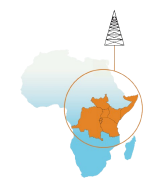The East African Community (EAC) comprises of eight (8) Partner States namely the Republic of Burundi, the Democratic Republic of Congo, the Federal Republic of Somalia, the Republic of Kenya, the Republic of Rwanda, the Republic of South Sudan, the Republic of Uganda and the United Republic of Tanzania, with a combined population of over 300 million.
The broad goal of EAC is economic, social and political integration so as to create wealth in the region and enhance competitiveness through increased production, trade and investment. Thus, the EAC seeks to improve the quality of life for the people of East Africa through its mission of widening and deepening integration and a vision of a prosperous, competitive and politically united East Africa.
Given the importance of energy in realizing this vision, the EAC Partner States have agreed to cooperate in joint exploration and development of energy resources found within the Community and to promote investment within the sector. The EAC Partner States seek to promote exploitation of both renewable and nonrenewable energy sources in the most optimal way for the mutual benefit of East Africans.
In this regard, the EAC has been holding the East African Petroleum Conference and Exhibition biennially since 2003 to promote exploration, development and production of oil and gas. The main objective of the Conference and Exhibition is to promote investment in the oil and gas sector by demonstrating to the world the potential that lies within the region and sharing information on the status of development of the sector in each Partner State.
The Conference offers a wide range of technical presentations reflecting developments in the oil and gas industry in East Africa and around the world. The Conference provides a forum for discussing the legal and policy framework and the overall business environment prevailing in the region. It gives stakeholders in the oil and gas sector an opportunity to interact with EAC senior government officials and decision makers.
The Conference and Exhibition programme integrates field excursions to selected sites in each Partner State for delegates to see the rich geological variety that the region possesses as well as the tourist attractions that the region is well known for.
The exhibitions and field excursions have become a popular feature of the Conference, attracting more and more participants with each successive Conference.
EAPCE’25, themed:Unlocking Investment in Future Energy: The Role of Petroleum Resources in the Energy Mix for Sustainable Development in East Africa, will provide a unique forum for dialogue for all players in the Petroleum industry regionally and internationally. Technical papers, paper posters, e-posters and exhibitions aligned to the conference theme are lined up to produce stimulating interactions among conference delegates. Field excursions to selected sites of geological and touristic importance in the region are being planned to give the delegates an unforgettable experience.
EAPCE'25 Thematic Areas:
- Exploration and Development
- Legal, Fiscal and Regulatory Regimes
- East African Rift and Coastal Basins
- Offshore Exploration Opportunities
- Field Development and Reservoir Management
- Mid & Downstream Opportunities
- Legal, Fiscal and Regulatory Regimes
- Crude Oil and Refined Petroleum Products Pipelines and Storage
- Refining Options for Crude Oil
- Natural Gas Processing, Transportation and Distribution
- LPG Infrastructure Development
- Value Addition in Oil and Gas Development
- Development of Virtual Pipelines
- Resource Revenue Management
- Petroleum Revenue Management
- Oil and Gas Markets and Impact of Global Prices
- Petroleum Projects’ Cost Monitoring and Auditing
- Transfer Pricing
- Energy Transition
- Clean Cooking
- Energy Integration
- Renewable Energy and Energy Efficiency
- Critical/Green Minerals for Energy
- Technological Advancements
- Other Investment Opportunities
- Capacity Building and Training Programs
- Farm-in Partnerships and Multiclient Studies
- Financing of Petroleum Projects
- Meeting the Regional Petroleum Needs
- Cross Cutting Issues
- Managing Environmental, Health, Safety, Security and Social Impacts in Oil and Gas Operations
- Local Content
- Data Management
- Governance in Extractive Sector
- Managing Stakeholder Expectations
- Geopolitical Influence on Petroleum Demand and Pricing
- Corporate Social Responsibility


